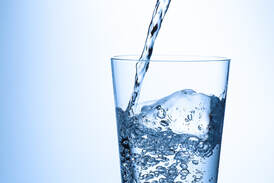 As you prepare yourself a nice dinner, you may think to pair the meal with a nice wine. Or perhaps the weekend rolls around and you plan social outings with friends or relatives, in which you think to indulge in a few drinks. However, if you're in preparation for a fitness event or care a lot about your performance in the gym — can alcohol still be included in your diet? Before we dive into how alcohol may affect your body, let's first review some basic alcohol metabolism. A CLOSER LOOK AT ALCOHOL & ITS EFFECTS ON OUR BODIES Alcohol contains 7 calories per 1 gram or 0.04 fl. oz. When we consume alcohol, it travels to our liver to be metabolized. Alcohol is quickly broken down into ethanol, which is an extremely toxic by-product. The body's main priority after alcohol consumption is to metabolize the ethanol into other less harmful by-products which can potentially be used for energy. However, alcohol metabolism disrupts other metabolic pathways that are also responsible for energy production. To digest and break down carbohydrates and fats for energy, certain molecules are required. Alcohol limits the body's ability to burn carbohydrates and fatty acids because it hogs these molecules and decreases their availability to do other things! Remember, how we mentioned that the body registers methanol as extremely toxic? Therefore, it will prioritize the breakdown of the methanol before it tries to break down carbohydrates or fatty acids! Okay, so alcohol interferes with our ability to digest carbs and fats… but does it affect muscle growth? Unfortunately, yes. 3 WAYS ALCOHOL AFFECTS MUSCLE GROWTH:
#1 ALCOHOL DISRUPTS PROTEIN SYNTHESIS Muscle tissue is in a constant flux of building and breakdown. When we exercise, various signaling pathways are activated to release amino acids from our muscles to help build new ones. To BUILD muscle, we need to consume dietary protein. The process of building new muscle is called protein synthesis. When alcohol is ingested, it inhibits or disrupts certain signaling pathways that tell the body to build muscle. #2 IT INHIBITS SIGNALS FOR BUILDING PROTEINS Additionally, it is also speculated that because alcohol inhibits signals to build proteins — this allows for activation of molecules that are responsible for muscle wasting. While signaling pathways are disrupted, studies have shown that total amino acid content is not decreased. #3 ALCOHOL INDUCES INSULIN RESISTANCE Furthermore, alcohol induces insulin resistance. Insulin is a potent stimulator of muscle growth and is responsible for the absorption of carbohydrates into muscles. With limited absorption ability, muscle growth and recovery are impaired. However, it doesn't end there… Alcohol affects men and women differently… HOW ALCOHOL AFFECTS MEN VERSUS WOMEN Fun fact ladies! Alcohol seems to have a more profound effect on muscle metabolism in men!
In rat models, the effects of alcohol on protein synthesis were seen more commonly in male rats with little to no effect in females. In human studies, similar findings are still present. In one study that looked at the effects of alcohol consumption in physically active males, there was a significant reduction in muscle protein synthesis (37%) when 1.5g/kg of alcohol was consumed after exercise. Even when 20-30g of protein was consumed in combination with alcohol, muscle protein synthesis was still reduced by 24%! For a man weighing 160 lb., that's roughly 8 drinks. Another study that compared the effects of alcohol on muscle protein synthesis following exercise in both men and women, found that alcohol only affected signaling pathways in men but not women. However, it should be noted that women are more sensitive to the long-term health effects of drinking. So, ladies, still not an excuse to try and out-drink your male counterparts. ALCOHOL AND TESTOSTERONE As you can imagine by this point if alcohol interferes with carbohydrate, fat, and protein metabolism it most likely interferes with our hormones as well. And you'd guess correctly because it does! Let's talk about our favorite hormone involved in muscle growth… Testosterone. Both acute and chronic ingestion of alcohol lower testosterone. While the mechanisms aren't fully understood yet, studies in male rats have shown that alcohol use largely affects the hypothalamic-pituitary-gonadal system, leading to lower levels of testosterone, decreased sperm production, and altered production of other reproductive hormones. The belief is that alcohol damages the cells that produce testosterone and causes inflammation in the body that suppresses testosterone production. And as mentioned, alcohol affects many other hormones that are responsible for your performance in the gym as well! ALCOHOL & CORTISOL Alcohol increases cortisol. If levels are elevated for long periods, this can lead to increased tissue breakdown. Alcohol decreases growth hormone which has negative effects on blood sugar maintenance and metabolism of muscles, bones, and the brain. Alcohol decreases luteinizing hormone, which in turn reduces testosterone production. Alcohol increases estrogen, which can have feminizing effects in males. On top of the changes, alcohol induces on metabolism and hormones, it also creates damaging products in our body that damage cells. As mentioned previously, the body registers alcohol as very toxic. When alcohol is metabolized it creates reactive oxygen species, which are molecules that cause a lot of damage to other cells in the body. So how much alcohol is too much? Where does the threshold exist before you start to do some serious damage to your fitness goals? HOW MUCH ALCOHOL IS TOO MUCH FOR FITNESS? While we all know "drinking in moderation" won't incur any damaging health effects, many of us would like to know a number to have a clear understanding of "moderation." According to research, consumption of 0.5g/kg of alcohol or less won't have an impact on muscle recovery following exercise. For someone who weighs 120 lb., that's about 2 drinks. For someone who weighs 180 lb., that's about 3 drinks. Sounds about standard when we think of the recommended number of drinks for men and women, right? Ideally, consuming 0.5-1g/kg of alcohol now and then won't reverse all your hard work in the gym. However, as that number increases to 1.5 or even 2g/kg some serious negative impacts are observed. Referencing back to the study mentioned earlier, 1.5g/kg of alcohol or 8 drinks for someone weighing 160 lb. decreased muscle protein synthesis by 37%! Imagine the level of damage that occurs when that number is surpassed? ALCOHOL AND FAT GAIN Aside from muscle growth, excessive alcohol consumption also leads to fat gain. One of the metabolic products from alcohol breakdown is Acetyl-CoA. This molecule can be used to enter different energy pathways, one of them being triglyceride (or fat) formation. ARE THERE ANY HACKS TO ALCOHOL CONSUMPTION FOR FITNESS GOALS? Well, to maintain peak performance in the gym, all alcohol should be avoided. However, some studies show if protein consumption is high and alcohol is consumed, the protein does seem to slightly blunt the damaging effects of alcohol. Carbohydrate consumption combined with alcohol consumption seems to have no benefit in preventing muscle breakdown. The only benefit it will provide is to decrease the rate at which alcohol is traveling to the liver to prevent excessive alcohol in the bloodstream. Overall, alcohol is not the most beneficial beverage when it comes to enhancing strength or performance. While it should be avoided, it's also very prevalent in the diets of almost every culture. So, drink responsibly and drink in moderation!
0 Comments
 Water is crucial for many bodily functions, such as lubricating the joints, delivering oxygen throughout the body, preventing kidney damage, and more. Around 60 percent of the body is made up of water, and around 71 percent of the planet’s surface is covered by water. Perhaps it is the ubiquitous nature of water that means drinking enough each day is not at the top of many people’s lists of priorities. To function properly, all the cells and organs of the body need water. Here are some reasons our body needs water: 1. It lubricates the joints Cartilage, found in joints and the disks of the spine, contains around 80 percent water. Long-term dehydration can reduce the joints’ shock-absorbing ability, leading to joint pain. 2. It forms saliva and mucus Saliva helps us digest our food and keeps the mouth, nose, and eyes moist. This prevents friction and damage. Drinking water also keeps the mouth clean. Consumed instead of sweetened beverages, it can also reduce tooth decay. 3. It delivers oxygen throughout the body Blood is more than 90 percent water, and blood carries oxygen to different parts of the body. 4. It boosts skin health and beauty With dehydration, the skin can become more vulnerable to skin disorders and premature wrinkling. 5. It cushions the brain, spinal cord, and other sensitive tissues Dehydration can affect brain structure and function. It is also involved in the production of hormones and neurotransmitters. Prolonged dehydration can lead to problems with thinking and reasoning. 6. It regulates body temperature Water that is stored in the middle layers of the skin comes to the skin’s surface as sweat when the body heats up. As it evaporates, it cools the body. In sport. Some scientists have suggested that Trusted Source when there is too little water in the body, heat storage increases and the individual is less able to tolerate heat strain. Having a lot of water in the body may reduce physical strain if heat stress occurs during exercise. However, more research is needed into these effects. 7, The digestive system depends on it The bowel needs water to work properly. Dehydration can lead to digestive problems, constipation, and an overly acidic stomach. This increases the risk of heartburn and stomach ulcers. 8. It flushes body waste Water is needed in the processes of sweating and removal of urine and feces. 9. It helps maintain blood pressure A lack of water can cause blood to become thicker, increasing blood pressure. 10. The airways need it When dehydrated, airways are restricted by the body in an effort to minimize water loss. This can make asthma and allergies worse. 11. It makes minerals and nutrients accessible These dissolve in water, which makes it possible for them to reach different parts of the body. 12. It prevents kidney damage The kidneys regulate fluid in the body. Insufficient water can lead to kidney stones and other problems. 13. It boosts performance during exercise Some scientists have proposed that consuming more water might enhance performance during strenuous activity. More research is needed to confirm this, but one review found that dehydration reduces performance in activities lasting longer than 30 minutes. 14. Weight loss Water may also help with weight loss, if it is consumed instead of sweetened juices and sodas. “Preloading” with water before meals can help prevent overeating by creating a sense of fullness. 15. It reduces the chance of a hangover When partying, unsweetened soda water with ice and lemon alternated with alcoholic drinks can help prevent overconsumption of alcohol.  Have you decided to make a healthy lifestyle change? Congratulations! Devoting time and attention to your health and fitness is quite possibly the most important investment you’ll ever make. But before you take the first step on your health and fitness journey, you’ve got to dig deep to determine your true WHY — why are you making the decision to prioritize your health? KNOWING YOUR WHY IS ESSENTIAL FOR GOAL SETTING Why do you want to improve your health and fitness? Take some time to really think about your specific reasons for starting down this path. Don’t do yourself a disservice by being vague — go deep, get specific. Instead of “I want to lose weight,” think about why you want to lose weight — does diabetes run in your family? Do you want to stave off chronic disease? What about keeping up with your kids? Or feeling more confident in your skin? Work to bring your underlying reason into crystal clear focus, because ultimately, that’s what allows you set concrete goals. If peeling back the layers behind your why feels difficult, that’s okay! USING YOUR TRUE WHY AS ONGOING MOTIVATION Once you really understand your true why and develop an emotional connection to it, it will serve as your intrinsic motivation throughout your health and fitness journey. But don’t confuse intrinsic motivation with extrinsic motivation, its frequently fickle cousin! Intrinsic motivation doesn’t fluctuate based on external factors. When you operate from a place of intrinsic motivation, you engage in healthy lifestyle activities because they’re deeply and personally rewarding to you. Essentially, your intrinsic motivation fuels your behaviors because those behaviors are the reward. Extrinsic motivation, on the other hand, is fleeting. It can fluctuate based on an endless variety of factors. When you use external rewards as motivation to exercise and eat healthier, you lack a deep emotional connection to your end goal. Essentially, you end up “going through the motions” to either get something positive in return or to avoid something you perceive as unpleasant. That’s why attaching your health and fitness goals to external motivators won’t serve you well on your health and fitness journey. USING YOUR WHY TO MAINTAIN YOUR LIFESTYLE LONG TERM Understanding your why helps make your healthy lifestyle choices enjoyable, and, by extension, sustainable. And that’s the key to maintaining your new lifestyle over the long term. If you know you want to improve your health because chronic disease runs in your family, ultimately, that will never change. You’ve chosen to take an active role in improving your health because maintaining your long-term well-being is deeply satisfying to you. There’s no time frame for completion, and no dissonance between you and your goal. Sustaining your healthy choices becomes far easier because you know they’re necessary to enjoy long-term well-being. Essentially, your intrinsic motivation forms the basis for the development of the traits that build true success: dedication and commitment. But, let’s say you tie your motivation to an external factor — maybe something like looking good for your high school reunion or getting back to your “happy” weight on the scale. While these goals sound like perfectly reasonable motivators to exercise and eat healthy, when used as a sole source of motivation, ultimately, they offer a pretty shallow reward. You don’t necessarily engage in healthy lifestyle behaviors because you deeply want to; rather, you end up doing these things as a means to an end. Realistically, however, there’s no end point when it comes to your health! Your body is the one and only body you’ll ever have, which means long-term maintenance of your healthy lifestyle is a must! |
AuthorBrian Lowe Archives
January 2024
Categories |

 RSS Feed
RSS Feed